Given the epic wait for a budget from the General Assembly, it’s easy to overlook the many other decisions and indecisions from our legislature since it convened in January.
Here is a perspective on the education budget by Ferrel Guillory. Here is another perspective on the education budget by Rep. Craig Horn (R-Union).
When we analyze the budget and other legislation, we think about what is good, what is not good, and what could be better. EdNC has covered the final budget compromise already, but for those of you who missed it, here are some things to note when it comes to education:
Raised starting salary for teachers to $35,000
Teacher assistants maintained
Driver’s education funded
Read to Achieve expanded
Opportunity Scholarship program ramped up
Textbook and digital resource funding boosted
Pre-K funding increased
Two items on that list are worth some attention: teacher assistants and driver’s education.
When the Senate budget proposal came out and the public saw that the chamber was proposing to cut 8,500 TA positions over two years and eliminating funding for driver’s education, the backlash was swift, furious, and sustained. Those two issues — particularly teacher assistants — were touched on again and again by members of the public, the media, and many lawmakers.
At the end of the budget process, when the conference committee report was released, it became clear that those two subjects were the priorities of the North Carolina people — and with the 2016 elections looming, the legislators responded. Funding for driver’s education and teacher assistants was restored. Because much of the politicking involving the budget compromise happens behind closed doors (so much for transparency), it’s hard to say what had to die in order for teacher assistant and driver’s education funding to live. But rest assured, there are some things no longer in the budget because TAs and driver’s ed funding are.
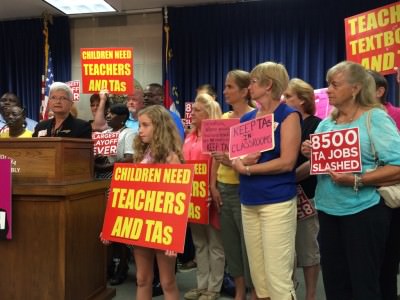

Are those two issues really the priorities? Or are there other issues, subjects, strategies where we should be focusing our energy and attention? We use “we,” as in “we the people.” All of us. The citizens of North Carolina.
Here is an analysis of this issue by Lynn Bonner of The News & Observer.
The end of federal Race to the Top funds put a serious dent in the state’s budget priorities when it comes to education. This budget includes no money for district and school transformation, professional development, or the principal leadership academies — all previously funded with federal RttT dollars.
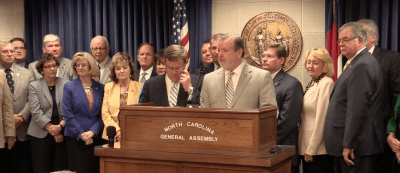

Vouchers
A last-ditch effort by Rep. Paul Stam, Speaker Pro Tempore (R-Wake), to expand who has access to the Opportunity Scholarship program was not successful.
Under current law, only 35 percent of the state’s “Opportunity Scholarships” can go to kindergarten and first-grade students. That limit was put into the original legislation to limit future program growth, since students who have vouchers in a given year are first in line for renewal the next year. Students who begin in kindergarten could receive vouchers for all 12 years of their primary and secondary education.
The bill, a proposed committee substitute for Senate Bill 456, would have increased that percentage from 35 percent to 45 percent.
The state budget increases funding for vouchers to $17.6 million in FY2015-16 and $24.8 million in FY 2016-17.
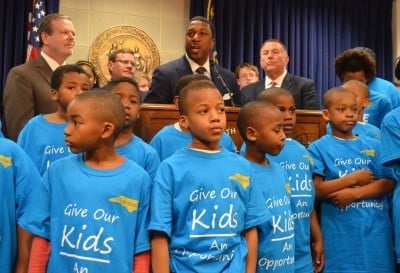

School flexibility
If one were to take volume as symbolic of importance, then the sheer number of bills filed to address school calendar flexibility would win. When we reported on this in April, there were more than three dozen bills related to giving local school districts more flexibility to decide their start and stop dates.
According to Leanne Winner, director of governmental relations for the North Carolina School Boards Association, 43 local bills asking for calendar flexibility for 75 counties had been filed, along with four bills asking for statewide local control of calendar start and stop times.
“I don’t think in my 20 years of doing this, I have ever seen an issue that had so many individual pieces of legislation filed,” she said at the time.
As it stands now, the state mandates start and stop times for public schools. If a school is not year-round, it can’t start earlier than the Monday closest to August 26, and it can’t end later than the Friday closest to June 11. There are some exceptions granted, but that’s essentially the deal.
Giving localities the power to circumvent the state’s mandate is popular amongst local education leaders, but the change has been stymied by the tourism industry.
Sen. Tom McInnis (R-Richmond) is one lawmaker who filed a calendar flexibility bill, but he said the powerful lobbies opposing the move would kill his legislation.
“The hospitality and the hotel and travel industry is one of the most powerful lobbies in North Carolina,” he said. “And if you do something to affect them or what they perceive to be affecting them, the wailing and gnashing of teeth as quoted in the Holy Bible will come out.”
Indeed his bill, and every single other one on the subject, went nowhere this session. And that was despite the efforts of a coalition called L.O.C.A.L., which brought together organizations such as the North Carolina School Boards Association, the John Locke Foundation, and the North Carolina Justice Center. If you’re paying attention, you’ll note that those last two organizations don’t usually see eye to eye.
When we talked to her in April, Winner said it was essential that calendar flexibility get addressed this session. She said if it isn’t handled until the short session of the General Assembly, schools and families may not have time to plan appropriately for any changes in schedule. And if nothing changes, schools can start no earlier than August 29, 2016.
“School has never started that late in this state in decades,” she said.
We’ll have to wait until the short session to see if something different this way comes.
School performance grades
School Performance Grades came out twice during this legislative session: for the first time in February and then again in September.
The grades weren’t great. Here are EdNC’s maps of the school grades so you can take a look yourself.
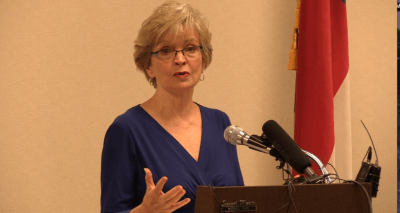

The way the grades are calculated came up for a lot of debate this session. They are created using a ratio that looks at academic achievement and academic growth, but the majority of the weight — 80 percent — is given to achievement.
Different versions of legislation that would adjust that ratio went nowhere in the General Assembly this session, despite the fact that even some conservative voices wanted to see a change. Stam was one Republican who expressed dissatisfaction with the current grading formula. In March, he likened the combination of growth and achievement to the unpalatable combination of Jello and mashed potatoes.
Despite the lack of amendments to the grade calculation ratio, one change — or rather, a move that prevented a change — did gain traction.
The grades use a 15-point scale, meaning that an A is 85 to 100 and so on down the line. But for next year, that scale was supposed to shift to a 10-point scale. Under a 10-point scale, many of the state’s schools would have received worse grades.
A bill passed that extended for another two years the use of a 15-point scale for North Carolina school A-F grades.
Charter school financing
The financing structure for charter schools did not change.
Way back in April, a bill that changes the funding formula for charter schools passed the Senate.
The difference in current funding between traditional public schools and charter schools is complicated, but it basically comes down to this:
Charter schools get the same per-pupil funding from the state and local districts as traditional public schools.
Certain kinds of revenue can be held back by school districts, but the Senate bill got rid of a lot of those exemptions, giving charter schools access, in some cases, to funds they were previously denied.
We reported on much of this in August.
That bill went nowhere in the House until less than two weeks before session ended.
That’s when — Lindsay Wagner formerly of NC Policy Watch reported — Sen. Jerry Tillman (R-Randolph) took a House bill on school playgrounds and jammed in language about charter school financing — language that would give charter schools access to some of the funds they were previously denied.
The Senate passed it, but again, it died in the House.
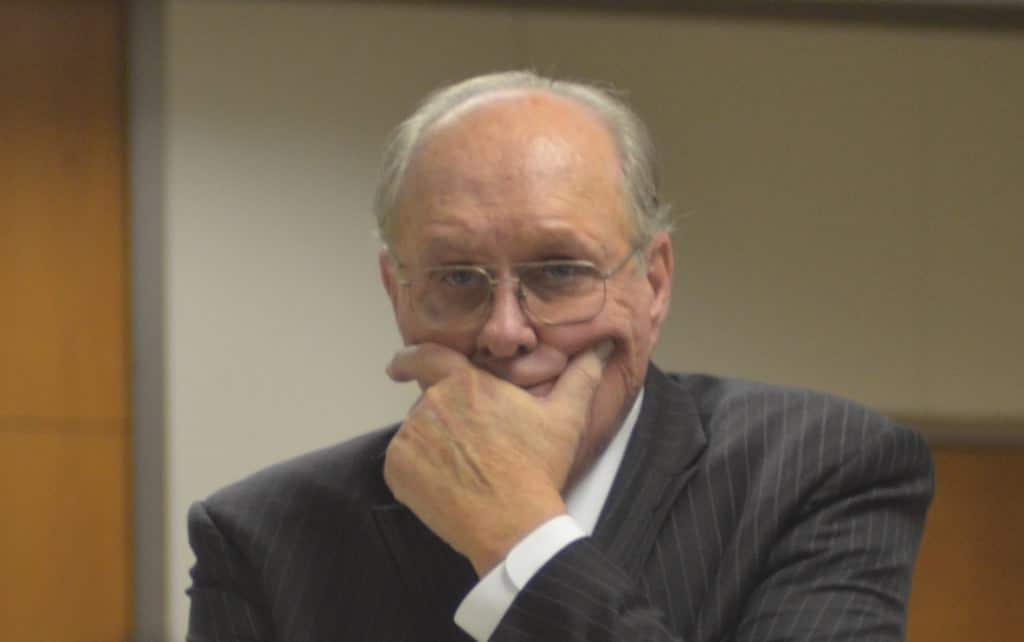

Achievement school district
And there was legislation by Rep. Rob Bryan, (R-Mecklenburg), which would set up an Achievement School District made up of five of the lowest-performing elementary schools in the state. The schools in the district were to be taken over and managed by charter operators.
Here was another bill inserted inside a bill originally proposed for a different topic. This time, the Achievement School District language was rammed into a bill focused on Reduction in Force policies for local boards of education.
Reports from other regions of the country showed mixed results when it comes to achievement school districts, and ultimately, Bryan’s legislation never even made it into a committee, according to Wagner.
Principal pay/leadership
Way back in January, we launched our website with an article on the principal salary schedule. We discovered many problems with principal pay, including the fact that many principals went years without much in the way of substantive salary increases from the state.
For instance, those principals who oversee 11 to 21 teachers have to wait until their 16th year for a salary increase on the step schedule from the state, and those who oversee 22 to 32 teachers will be stuck at the same pay level until their 18th year. The wait is the worst for principals at the highest level — those who oversee 101 or more teachers. The first pay bump doesn’t come until the 24th year.
There were some attempts to address principal pay and training this session, but not many went far.


The most ambitious talk came from Tillman, who expressed his desire to get rid of the principal salary schedule altogether, and instead give a block of money to districts to apportion for principal pay as they saw fit.
In a Joint Appropriations Subcommittee on Education in March, Tillman said he planned to introduce legislation to achieve this goal.
“You hire your principals based on ability and how they’re going to improve the test scores and the atmosphere and the discipline in the school,” he said in an interview after the meeting. “If you can do those, you pay them a lot. If they can’t do those things, you either get rid of them or you keep them stagnant on the pay scale.”
It never happened.
A bill that would have addressed principal leadership also stalled.
“Great Leaders for Great Schools/Study,” sponsored by Democrats Rep. Tricia Ann Cotham and Rep. Cecil Brockman, and Republican Rep. Craig Horn, instructed the Joint Legislative Education Oversight Committee to “study strategies for providing North Carolina with great leaders for great schools.”
At the time, back in March, Cotham said we needed to think differently about how we pick our school leaders.
“We have to make sure that we have the best people lined up to take those jobs,” Cotham said. “And not that they want to take it for a raise or a title.”
The bill passed the House but never went anywhere in the Senate.
A bill championed by Horn would have transformed principal preparation in the state. It was part of a package of four bills that eventually got rolled into the House budget.
The bill, HB 902, would have established a competitive grant program administered by the State Education Assistance Authority in cooperation with a nonprofit to identify entities to prepare and support highly effective school principals in North Carolina.
The other bills in the package of four included a teacher recruitment and scholarship program, a program that would develop new methods of compensation for effective teachers or for teachers who took on extra responsibilities, and a bill meant to aid the state’s transition to digital learning.
The principal training program remained in the budget, as did pieces of the digital learning transition bill. Neither received the level of funding initially proposed in the House budget.
Other bills, filed in the House and the Senate, tried to address principal pay through modest pay increases, bonuses for achievement and a study of how to improve school leadership. They also went nowhere.
Keep in mind that when I say a bill “went nowhere,” I’m not saying it got voted down. I’m saying it never even came up for a vote. It just went to some committee and sat there until session ended.
The Taxpayer Protection Act
The “Taxpayer Protection Act” seemed like it was gaining traction in late summer. It passed the Senate, and if the House had passed it, the governor had signed it, and voters approved it, North Carolina would have become only the second state in the nation to adopt the so-called “Taxpayer Bill of Rights.”
The bill had three main provisions:
- capping the state personal income tax rate at 5 percent
- creating an emergency savings fund that could only be spent after a two-thirds majority vote in the legislature
- restricting annual state budget spending to population growth plus inflation — this provision is the actual “Taxpayer Bill of Rights”
Originally, those three provisions would have all gone before voters in three separate constitutional amendments. But lawmakers made a change that bunched the three provisions together into one amendment for the voters to decide on.
The impact on education from the only other state to adopt TABOR — Colorado — has been unexpected. “Colorado’s experience should serve as a cautionary tale for other states as they consider enacting tax and expenditure limitations,” Phyllis Resnick, an economist with the Colorado Futures Center, said. “In many cases, Colorado’s property tax limits relied on simple formulas that failed to take into account the complex factors affecting school district financing, such as changing local economic conditions and volatile school enrollment. As a result, these limits have served mostly to redistribute – rather than reduce – Coloradans’ tax burden.”
The Taxpayer Protection Act didn’t go anywhere in the House. See this article by John Hood with the John Locke Foundation about the difference between the Taxpayer Protection Act and TABOR.
What else happened?
Here’s a list of education legislation that did actually pass. Some of it is more significant than others, but for the most part, the major education initiatives were in the budget.
Takeaways
When it comes to education, much of this General Assembly session was significant more for what didn’t happen. Many ideas were put forth — some controversial, some not — that went nowhere. Many of the substantive changes to the state’s education system came by way of the budget rather than individual legislation. What we see when we look at the legislation proposed this session, whether it was successful or not, is foreshadowing of the issues that will continue to populate the minds of lawmakers in the legislative sessions to come. Principal pay and leadership, teacher pay, school flexibility, charter schools, opportunity scholarships, school performance grades…these are issues we are likely to see revisited time and time again.
Our legislature will reconvene on April 25, 2016.



